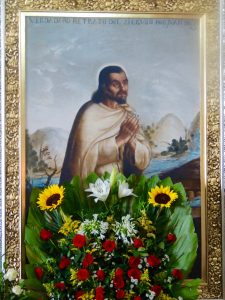HOMILY ADVENT WEEK 02 03 – Year I
Yoked with Jesus:
Optional Memorial of St Juan Deigo Cuauhtlatoatzin
(Is 40:25-31; Ps 103; Mt 11:28-30)
***************************************************
In the gospel today, Jesus reassures us that his yoke is easy, and his burden is light. We are not to avoid suffering, but to turn to him for the strength and power to accept suffering as he did, without resentment or bitterness.
Years ago, Fr. Jim Fiori and I visited the Dené community at Cree Lake in northern Saskatchewan. We stayed in the log cabin built by a Norwegian trapper, and prayed in the log chapel there. I had to get water in pails from the lake down a steep hill, and managed to spill half of it on the way up.
When we closed the door for the night, however, we discovered a hand-carved neck yoke hanging on the wall. The next morning, I was able to literally jog up the hill using the neck yoke, pails full, without spilling a drop. That is how Jesus wants to help us accept suffering in our lives, through his power.
That prayer is called the prayer of the Anawim – a Hebrew word meaning the poor who know they need God, like Joseph and Mary, Zechariah and Elizabeth, Joachim and Anne – humble people who have no pretence.
That is the prayer Peter learned walking on the Sea of Galilee. His first prayer to Jesus, “Lord, make me come to you on the water,” was proud prayer from his head. I think I know what happened to Peter as he walked on that water – he got proud, took his eyes off Jesus, looked back to the boat to show off, felt the wind and started to sink like a stone. He was drowning, and knew no one else could help him but Jesus. Now his prayer came from his guts – three words – “Lord, save me!” That is the prayer of the Anawim – a sincere prayer out of our need for God.
Anyone can go through a day without prayer if they are stubborn enough, or afraid enough, like an alcoholic who can no longer drink. However, that is called a dry drunk – sobriety without healing or real meaning in life. God does not want survivors – God wants thrivers. None of us can live this day the way God wants us to live it, free and joyful, without the power of the Spirit of the Risen Jesus.
Sincere prayer from the heart, out of our need, first thing in the morning, is the answer and the message of the Gospel for today. It is this kind of prayer that will yoke us to Jesus, give us the strength to accept some suffering in our lives without bitterness or resentment, and place us within the kingdom of God.
Those who are members of a 12 Step program are already living this spirituality through Step One: “Admitted that I was powerless over alcohol or something in my life, that my life was unmanageable.” That, too, is the prayer of the Anawim.

St. Juan Diego
Today we honor St Juan Diego Cuauhtlatoatzin, to whom the Blessed Virgin Mary appeared on this date in 1531 at Tepeyac, near Mexico City. She told him that a church should be built at the site of her appearance. On another visit, Our Lady sent Juan Diego to gather flowers and present them to the bishop. When he did so, the flowers fell away, revealing an image of the Blessed Virgin that miraculously appeared on his rough garment or tilma. That relic, that should have disintegrated centuries ago, is on display in the Basilica of Our Lady of Guadalupe in Mexico.
After this momentous event in his life, Juan became a catechist and could not stop spreading the message of what he had experienced. He taught, proclaimed the good news of the kingdom of God and the healing that his uncle had experienced through Our lady, and certainly became a source of hope for thousands of other Indigenous who came to be baptized because of him. He is an example for us of someone who lived today’s readings. He was canonized in 2002.
The Eucharist is our own theophany, our own encounter with Jesus, through word and sacrament. May our celebration today strengthen our faith and help us to pray each morning the Prayer of the Anawim, so that, yoked to Jesus, we can accept some suffering in our lives as Jesus did, without bitterness or resentment, so as to live each day in the kingdom of God.



